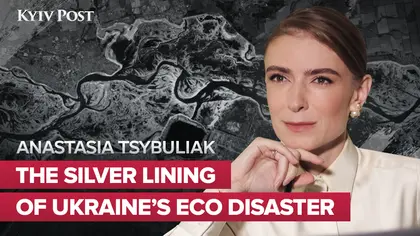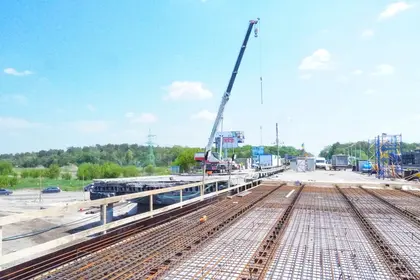On June 21-22, the annual Ukraine Recovery Conference (URC, formerly Ukraine Reform Conference prior to 2022) will be held, this time in London. It will be the second such conference since Russia invaded Ukraine on the fateful morning of Feb. 24, 2022.
Important announcements are likely. Ukraine’s government will get a chance to present to the international public its updated strategy for post-war recovery. Integral to that, will no doubt be the massive Digital Restoration Ecosystem for Accountable Management (DREAM).
JOIN US ON TELEGRAM
Follow our coverage of the war on the @Kyivpost_official.
This IT “system of systems” has been created as a single digital pipeline for reconstruction projects. It serves to enable the management of all stages of all reconstruction projects, ensuring at the same time that all data on these projects is kept open to public scrutiny. DREAM is set to be the key system that authorities in charge of post-war reconstruction, headed by Deputy Prime Minister Oleksandr Kubrakov, will use to rebuild Ukraine’s damaged infrastructure.
International partners at the URC, in turn, will have a chance to comment on this strategy, outline their own vision on how the future recovery of Ukraine will proceed, and set out the resources that they are prepared to commit. Perhaps they will make hints – or even announcements – about the long-term plans for Ukraine’s future on the international arena, such as its membership of the EU and the security framework in which it will exist once the war is over.

Ukraine’s Kakhovka Dam Disaster, Environmental Restoration and Scientific Opportunity
Yet, in the “narrow” context of post-war recovery – and long-term economic growth afterwards – of Ukraine, two things stand out, which need to be decided upon for the recovery to be successful.
Russian assets for Ukraine’s recovery
The first is the source of the massive funding required. It is clear that Ukraine’s reconstruction will cost hundreds of billions of US dollars. Damage to infrastructure alone has been estimated at $144 billion and, given continuing Russian missile and artillery strikes across the country, this number is increasing by the day.
Several things are clear: that someone will have to pay this enormous bill; that Ukraine by itself will not be able to finance it; and that the Western taxpayer should not be forced to foot the bill for the damage that Russia has inflicted.
The most justified source of funding for Ukraine’s recovery is the estimated $300 billion of Russian assets (mostly belonging to the Central Bank of Russia) currently frozen in Western banks. The use of these frozen assets is a fair and just solution, as it does not burden Western taxpayers and holds Russia accountable for its actions. Furthermore, these assets can be used even if Russia does not formally agree to pay reparations and indemnities – something which it is unlikely to do.
While some might argue that seizing frozen Russian assets would undermine property rights in the West, this argument is flawed. Using assets of criminals to compensate their victims is a well-established legal procedure, and Russian aggression against Ukraine is a clear violation of international law. Moreover, it can be argued that Russian money is so dirty that it should not have been allowed into the Western financial system in the first place.
If major announcements about Russian assets being confiscated and used for the needs of Ukraine’s reconstruction are made at the URC, this will already make the conference a stunning success. Admittedly, right now, it does not look likely. But let’s keep our hopes up.
Private sector integration
The second issue that remains unaddressed is the role of the private sector in Ukraine’s reconstruction. True, the private sector features prominently in all major discussions about the country’s economic future; indeed, everyone touts the necessity of attracting private investment and is paying lip service to the virtues of the free market. But when it comes to specific recovery mechanisms, those intended for the public sector are typically designed and worked through in detail, but the private sector remains largely unintegrated into the reconstruction process.
Clarification of the mechanisms that would properly integrate private sector companies – both international and Ukrainian – into the process of reconstruction would therefore be a very welcome announcement at the URC.
Such mechanisms have already been discussed and elaborated upon in the expert community. They include, but are not limited to the following: cheap loans to businesses investing in Ukraine, financed with reconstruction funds using blended finance techniques; allocating reconstruction monies to private equity funds specifically targeted at the reconstruction via a fund of funds or similar financial vehicle; establishing broad war risks insurance programs; and even providing investment stimuli to major international corporations making big investments into Ukraine. Other similar mechanisms would work as well – the point is to clearly communicate them to the public at the URC and then implement them in practice.
If both issues – use of frozen Russian assets and the integration of the private sector into the reconstruction – are meaningfully addressed at the URC, the conference can truly become a breakthrough. With the money clearly on the table, and the mechanisms for allocating these monies clearly established, investors will flock to the project of Ukraine’s reconstruction, which is already sometimes called “the construction project of the century.”
Quick and sustainable economic growth will be sure to follow. Let’s keep our fingers crossed!
The views expressed are the author’s and not necessarily of Kyiv Post.
You can also highlight the text and press Ctrl + Enter






